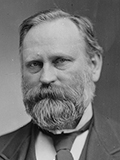

- Yick Wo v. Hopkins Full Program
- Case Preview
- Chinese America: The Untold Story
- U.S. Constitution Equal Protection Clause
- Apologizing for the Chinese Exclusion Act 1882
- 19th Century Chinese Immigration
- Rep. Judy Chu (D-CA) on Chinese Exclusion Act
- Judge Harry Low on Chinese Immigrants
- Chinese Immigrants at Angel Island
Yick Wo v. Hopkins The Court's decision in this was seen as trailblazing -- it struck down legislation aimed at closing Chinese-operated laundries in San Francisco and guaranteed non-citizens the Constitution's protections. It was the first case to use the "equal protection" clause of the 14th Amendment, which prohibits states from denying any person within their jurisdiction the equal protection of the law. In a unanimous decision the Supreme Court ruled laws with discriminatory intent were unconstitutional. This landmark case has been cited over 150 times since the Court's decision.
Many Chinese migrated to the U.S. during the Gold Rush and owning laundries was a common business among these immigrants. Yick Wo was one such laundromat. Most Chinese laundries were in wooden buildings and in 1880, San Francisco's board of supervisors passed legislation banning laundries from operating in wooden buildings without a permit. Following the law's passage, every single Chinese owned laundromat was denied permits while only one white owner was denied a permit. The owner of Yick Wo laundry was charged with violating the law after he continued to run his business without a permit.
The Supreme Court overturned his conviction and ruled it was unconstitutional to discriminate against a group of people in passage or enforcement of legislation. This decision opened the doors for immigrant integration in American society and established precedent for subsequent cases with similar issues affecting non-citizens.
 Explainers
Explainers



